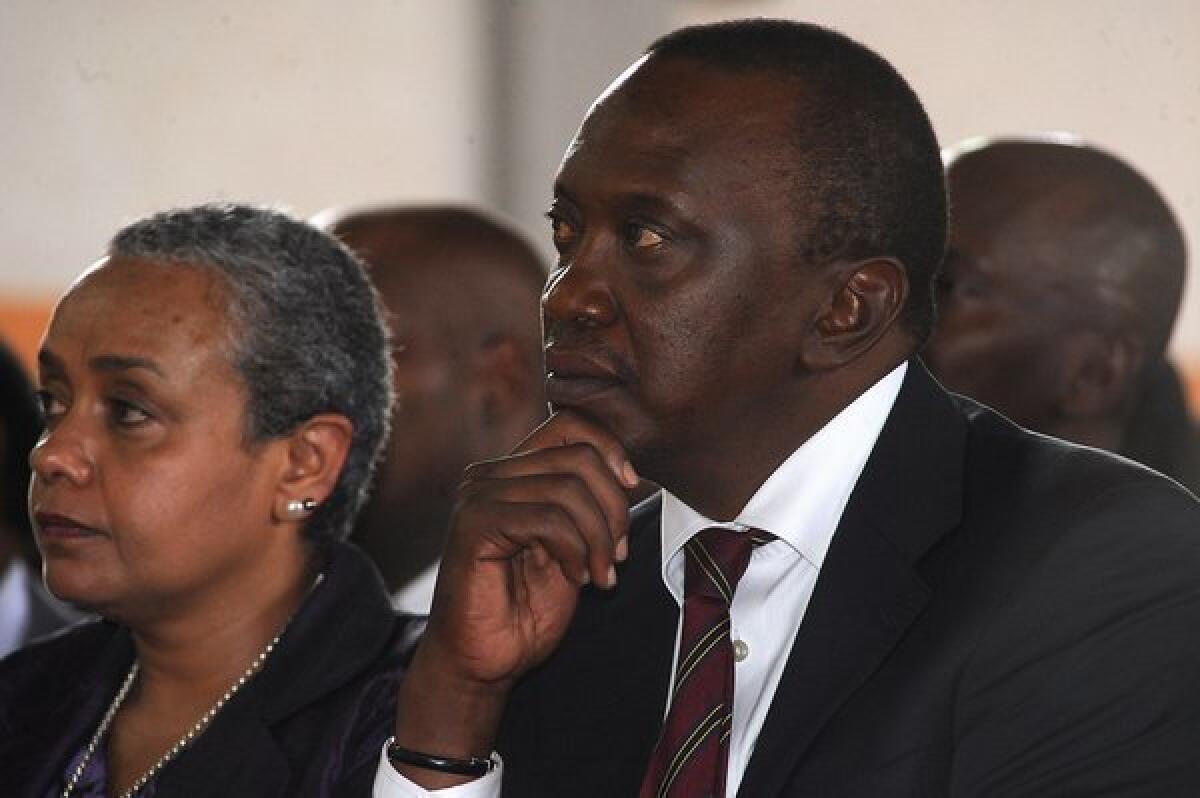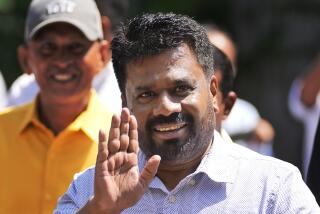Kenya election over, dispute over outcome heads to Supreme Court

- Share via
NAIROBI, Kenya -- As Kenya faced another disputed election Sunday, the country passed an important test: Despite outrage among many Kenyans over a result they saw as flawed, there was no major outbreak of violence. A massive deployment of security forces dispersed the few protests, earlier banned by Kenyan authorities.
Kenyans were determined to break with the past, after tribal violence broke out in the wake of the disputed 2007 election, killing more than 1,000 people and tainting the country’s reputation as an emerging democracy.
But in the drive to avoid dissent and violence, the country brushed aside what some activists called a failed election, caused by the repeated blunders and technical problems of the Independent Election and Boundaries Commission.
After a divisive and tense election, Kenya now faces an equally tense Supreme Court hearing on its outcome, with cases to be brought not just by the losing side, but by a group of independent anti-corruption activists, the African Center for Open Governance.
Prime Minister Raila Odinga refused to concede defeat to challenger Uhuru Kenyatta, saying it was impossible to know who won the election because every instrument of the election commission had failed. The election commission declared Kenyatta the winner.
Citing “rampant illegality,” Odinga said he was challenging the result in the court to defend Kenyan democracy.
He said the complaints of his party’s agents had been ignored and they had been shut out by the election commission, which refused to countenance a recount, despite the extremely narrow margin by which Kenyatta surpassed the 50% threshold to avoid a runoff.
The narrow margin and repeated failures of the election commission raise the possibility that the Supreme Court could call for an audit of the election result, analysts said.
Kenyatta got 50.07% of the vote, crossing the line with a margin of some 8,000 votes out of more than 12 million cast.
Despite the failures, Kenya’s news media were muted in their reportage of the commission problems. Even international observers have tip-toed around the subject.
However, respected Kenyan anti-corruption crusader John Githongo called the election a failure Sunday. Githongo, an election monitor, said for months a group of community organizations had tried in vain to warn the election commission of problems in its systems and approach.
“In my personal opinion, it’s a failed election,” Githongo said in an interview with The Times. “I think the IEBC performance was catastrophic. I was part of a group of organizations that repeatedly warned them that these problems were there and on the way.”
Commission Chairman Issack Hassan denied the problems and failed to turn up for meetings with the organizations, according to Githongo.
Githongo said Kenyans were so keen to avoid a repeat of the violence that followed the disputed 2007 poll that many, especially in the Kenyan media, kept silent about the obvious problems in the election commission.
“We all saw the IEBC as a boat in which all the Kenyan people were sailing. We could all see lots of holes and we thought we could plug the holes lest the whole boat sink. No one wanted to say that the captain of the ship didn’t know what he was doing,” he said.
Githongo’s criticisms come after reports that Safaricom, the mobile phone provider involved in the electronic system that was supposed to transmit results to the central tallying point, also warned the commission of looming failures in the weeks before the election, and was also ignored.
Patrick Smith, editor of the journal Africa Confidential, said Western officials privately condemned the commission’s appalling performance but said nothing publicly “for fear of being seen as interfering in the election”.
The losing candidate, Odinga, “has a very low bar to reach” in the court case, according to Smith. “All that he’s got to do is to prove beyond doubt that there are real questions about that margin. The fact is, even the votes they have announced don’t add up as a total, which suggests there are some real mathematical problems as well as logistical and technological problems,” Smith said.
Despite the lack of violence so far, things could get very tense once the Supreme Court made a decision on the challenge, Smith said.
“The trouble could come if the court says, ‘We want an audit.’ If after an audit it’s found the results of the election are not safe and is not legitimate, then I think you are into a new game,” Smith said.
ALSO:
Kenyan presidential loser Raila Odinga contests result
Protests follow upholding of death sentences in Egypt soccer riot
More to Read
Sign up for Essential California
The most important California stories and recommendations in your inbox every morning.
You may occasionally receive promotional content from the Los Angeles Times.













